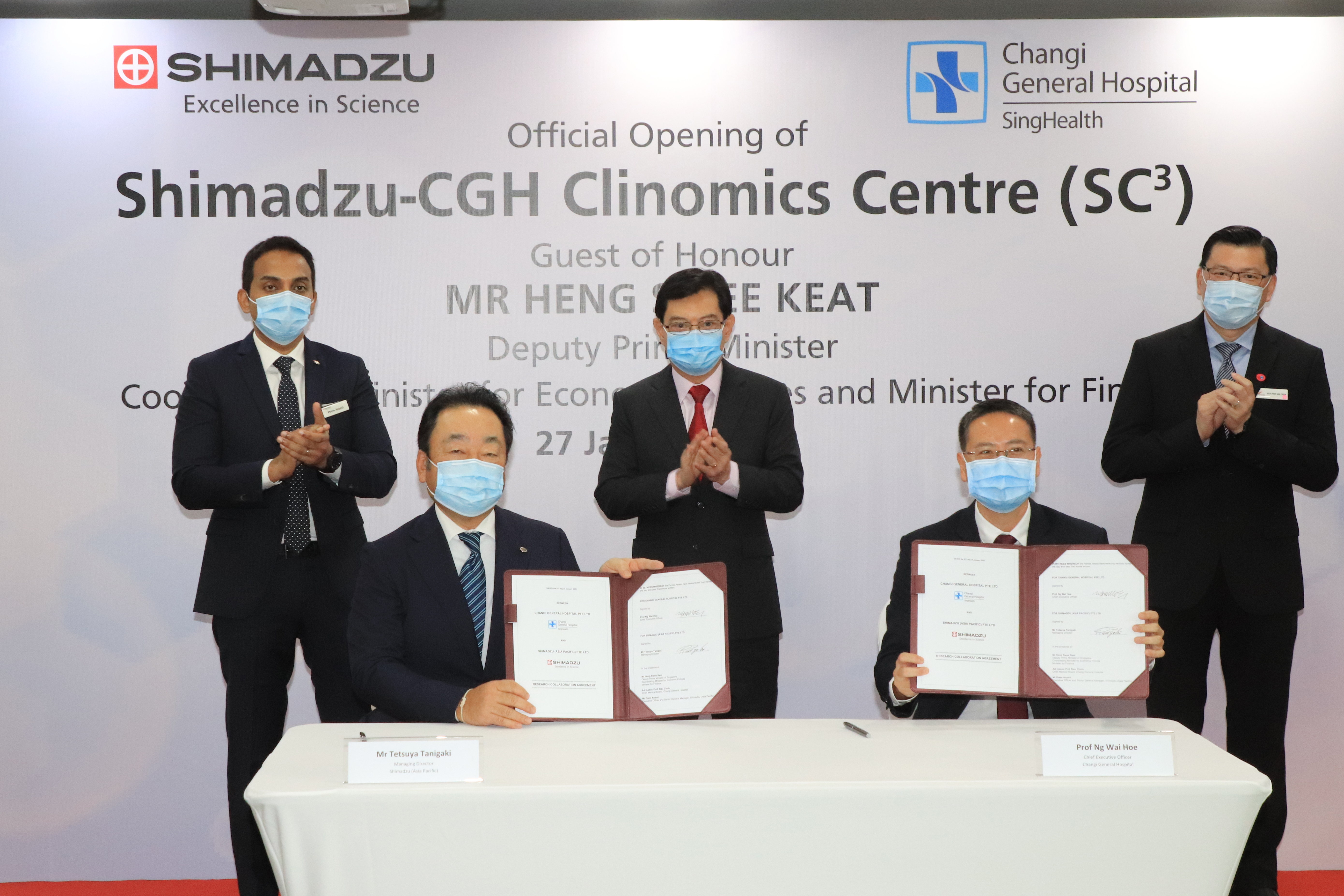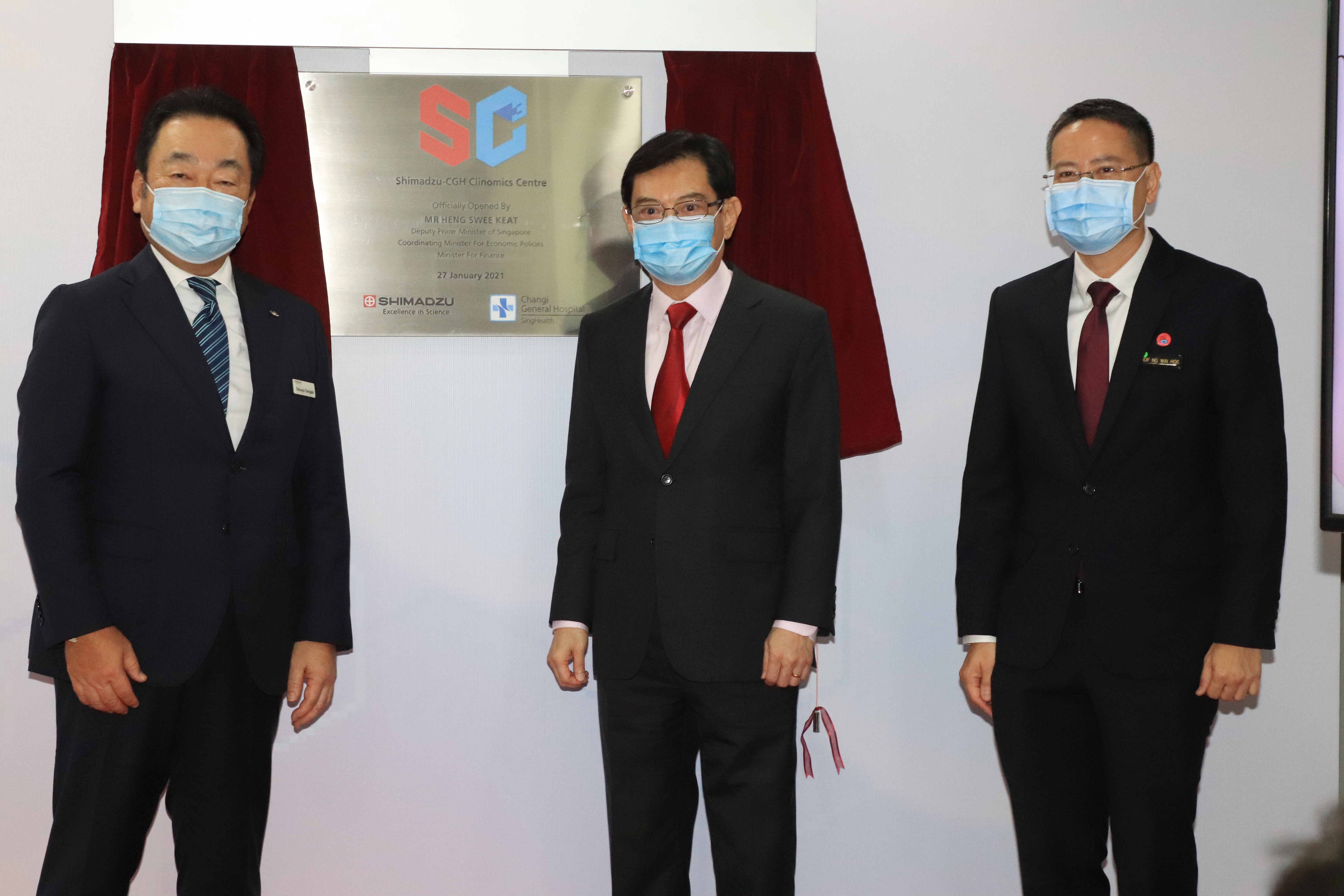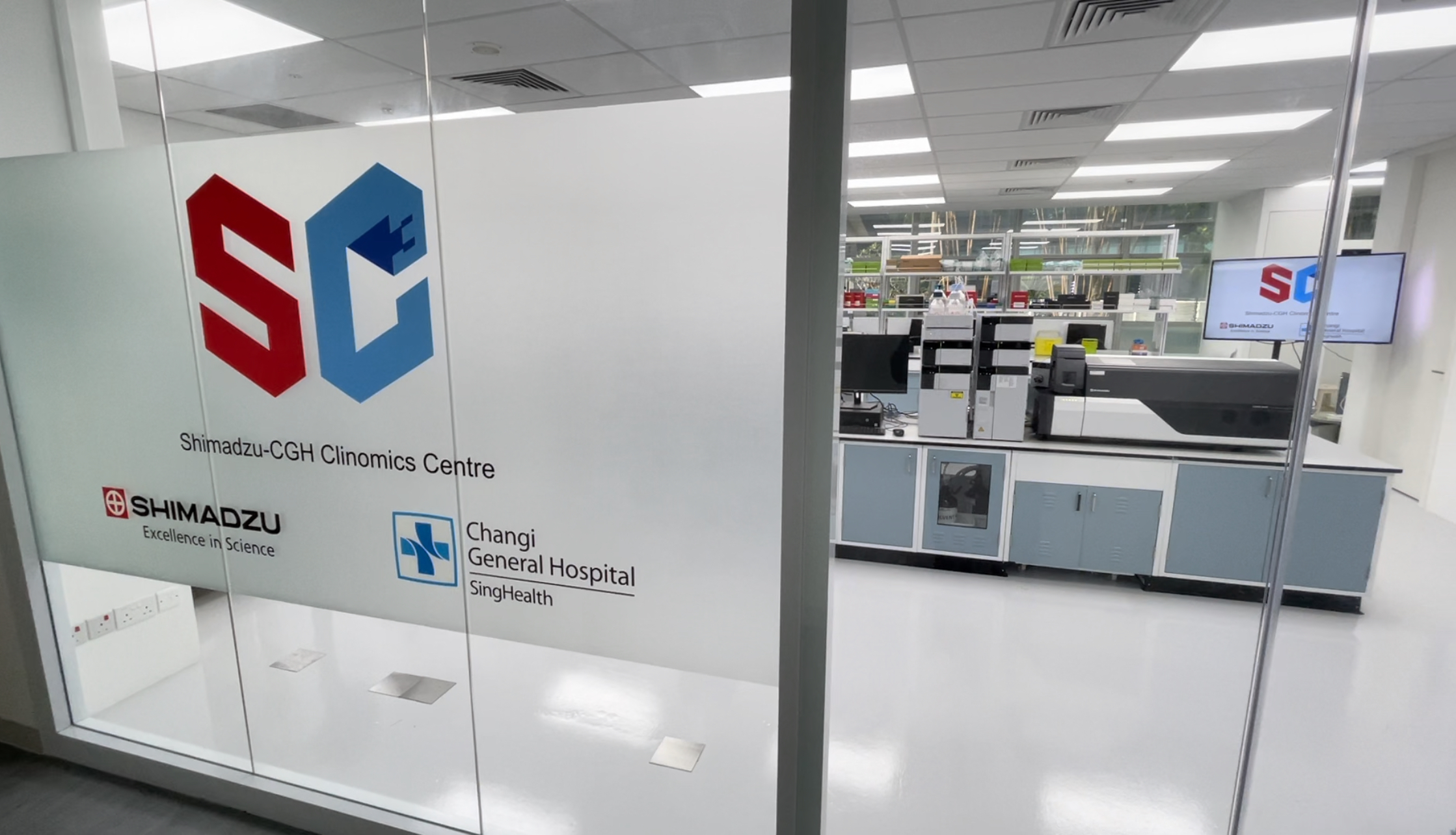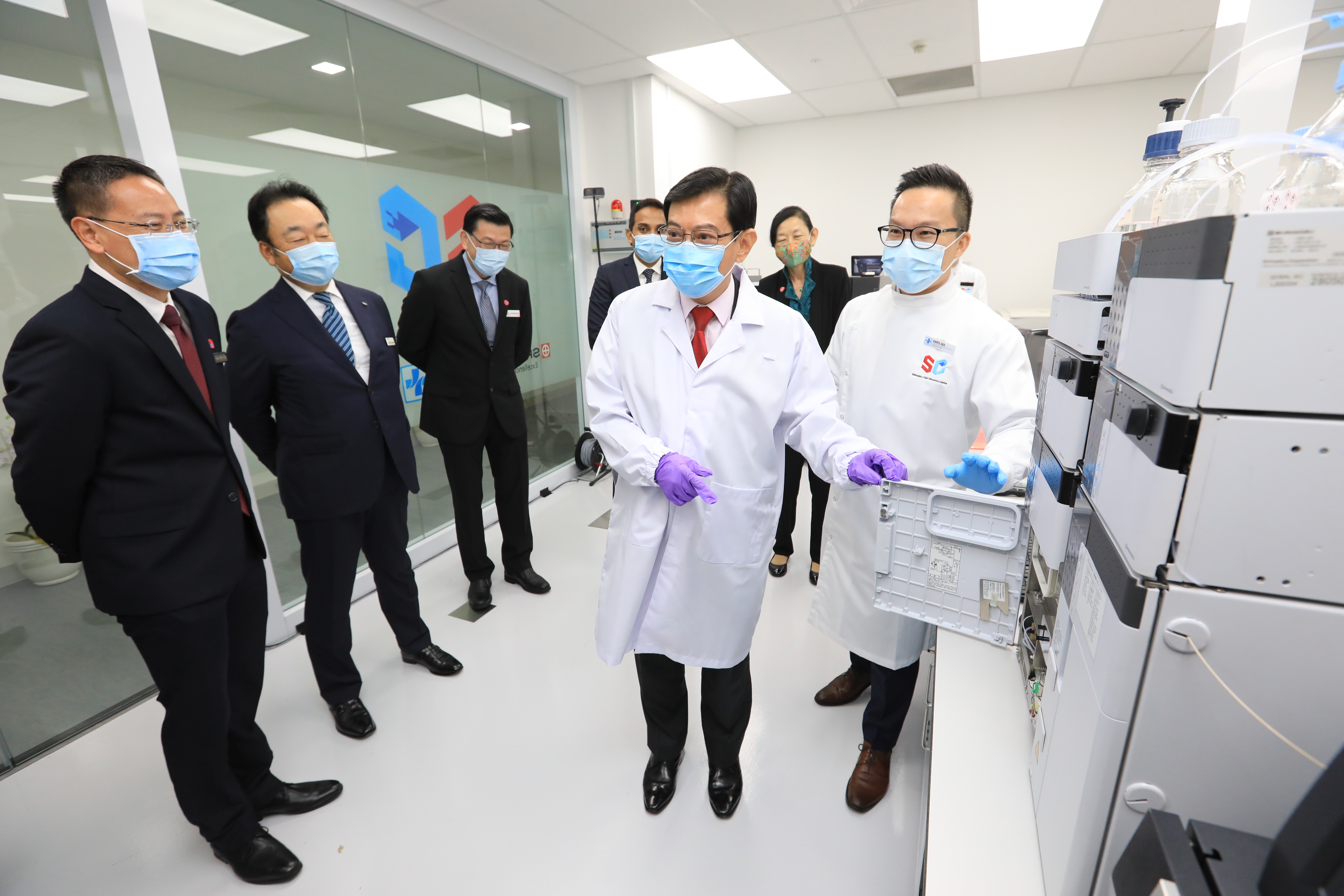The Shimadzu-CGH Clinomics Centre (SC3), a public-private partnership by Singapore’s Changi General Hospital (CGH) and Shimadzu (Asia Pacific), to conduct mass spectrometry-based clinical testing & research for personalised treatment, was officially opened by Guest of Honour, Deputy Prime Minister Heng Swee Keat. A satellite laboratory of CGH, the initial SC3 operations will focus on developing and validating various clinical applications and research to improve clinical diagnostics, which will improve turnaround time and clinical diagnostic accuracy of diseases such as hypertension and other endocrine conditions in adults.
 Singapore's Deputy Prime Minister Heng witnessed the signing of the
Singapore's Deputy Prime Minister Heng witnessed the signing of the
Research Collaboration Agreement between CGH and Shimadzu (Asia Pacific)
Professor Ng Wai Hoe, Chief Executive Officer, CGH, said, “The coming together of the clinical and research expertise of CGH and SingHealth with Shimadzu’s diagnostic and analytical capabilities will contribute to medical care and treatment in Singapore. At SC3, we will co-create clinical applications through mass spectrometry technologies and instruments that will enhance the standard of care for our patients.”
Mr Tetsuya Tanigaki, Managing Director, Shimadzu (Asia Pacific) Pte Ltd, highlighted, "Excellence in Science is not only a motto but a way of life in the Shimadzu Family. And it is with this philosophy that we, along with CGH, are powering the SC3 lab with futuristic technologies such as mass spectrometry and Analytical Intelligence among several others, to ensure that we deliver more accurate and faster outcomes to patients. This Centre is an example of how we can collaborate to establish a pioneering partnership for Advanced Healthcare. This is the first time that Shimadzu is working with a public hospital to establish a Clinomics Laboratory in Singapore. Our efforts will certainly transform the healthcare landscape of not only Singapore and the Asia Pacific region but also of the world."
 Singapore's Deputy Prime Minister Heng officially opened
Singapore's Deputy Prime Minister Heng officially opened
the Shimadzu-CGH Clinomics Centre on 27th January 2021
Using a more accurate method for analysing clinical samples
Leveraging the technology of liquid chromatography coupled with tandem mass spectrometry (LC-MS/MS) powered by analytical intelligence, the SC3 seeks to improve clinical diagnostic accuracies for patients. In clinical laboratories, immunoassays are the main methodology for conducting clinical diagnostic tests to measure vitamins, hormones, and antibodies. However, different hormones often share similar structures, which can lead to inaccurate measurements using immunoassays. LC-MS/MS technology is rapidly gaining recognition in clinical laboratories for analysing clinical samples, as it offers higher analytical specificity and sensitivity compared to immunoassays.
 Shimadzu-CGH Clinomics Centre (SC3) - powered by UFMS and Analytical Intelligence (AI)
Shimadzu-CGH Clinomics Centre (SC3) - powered by UFMS and Analytical Intelligence (AI)
“The benefit of LC-MS/MS technology over the immunoassay is that our patients need not provide the same amount of blood samples for multiple tests. As it is also a highly specific and sensitive technology, the mass spectrometer can measure multiple test compounds in a single sample with greater accuracy. Patients will be comforted to know that the tests are more accurate, and the sample required from them will be significantly reduced,” said Dr Daryl Hee, Senior Manager, CGH who is in charge of the SC3.
Providing precision and personalised medicine for Singaporeans
One in four adult Singaporeans suffers from hypertension, which is a leading cause of heart disease and strokes. It is now understood that hypertension is due to either excessive vasoconstriction (tightening of blood vessels) or excess salt and blood volume*. Precise measurements of hormones can identify which spectrum of hypertension a patient has, and which medications are best suited for that patient.
In recent years, hormone measurements also identify many patients with a treatable and curable form of hypertension (Primary Aldosteronism).
Clinical Assistant Professor Troy Puar, Principal Investigator and Consultant, Endocrinology, Changi General Hospital said, “Although treatment is available for hypertension, many patients still have uncontrolled blood pressure. Treatment of hypertension is not precise as each patient is different and their cause of hypertension may differ. When one medication does not work, doctors may choose to increase the dose, add another medication, or switch to another medication. By measuring precisely, the type of hypertension that each patient has from the outset, doctors are able to know which antihypertensive medication works best for the patient, thereby enabling delivery of precise and personalised medicine.”
Mr Prem Anand, Executive Officer and Senior General Manager, Shimadzu (Asia Pacific) Pte Ltd, said, "Today, precision and personalised medicines are being fuelled by the merger between analytical and medical technologies. These technologies are more relevant today than ever before, as more and more researchers are now using them concurrently. The fact that Shimadzu is the only company in the world to be a leader in both analytical and medical technologies, gives us the unique opportunity to develop truly synergistic solutions for Advanced Healthcare. The launch of this Shimadzu-CGH Clinomics Centre is yet another reiteration of how we all can collaborate towards Contributing to Society Through Science and Technology".

Singapore's Deputy Prime Minister Heng views the mass spectrometer at the Centre
Achieving faster turnaround time for test results
With the SC3, it is envisioned that clinical tests based on the LC-MS/MS technology for adult diseases will no longer need to be routinely sent to overseas centres for processing. By developing the capability to conduct such tests in Singapore, local and even regional patients can receive their test results with a significant reduction in waiting time from approximately two weeks to one or two days.
Serving as a regional reference centre
In the long term, the SC3 aims to offer validated tests to patients in Singapore as a clinical laboratory and to serve as a regional reference centre in Asia Pacific for developing mass spectrometry solutions for wider clinical applications for chronic conditions and other areas of clinical diagnostics, such as drug monitoring. Measuring the efficacy of medication for patients with other common conditions, such as diabetes, can allow for more personalised treatment options, which can lead to better patient outcomes.
The SC3 is built to Biosafety Level 2 (BSL2) laboratory specifications and located inside the facilities of Shimadzu (Asia Pacific) at Singapore Science Park 1, where a team of clinicians from CGH and scientists from Shimadzu will jointly work to develop mass spectrometry-based solutions for clinical applications.
* References
Laragh J.H; Sealey J.E. (2011) The Plasma Renin Test Reveals the Contribution of Body Sodium-Volume Content (V) and Renin-Angiotensin (R)
Vasoconstriction to Long-Term Blood Pressure. American Journal of Hypertension. 1165.



